COVID-19 pool testing gets FDA approval to ease burden on resources and save time
The approach being proposed will collect samples from up to four individuals which are then mixed in one batch that will use up one testing kit only.
As predicted by health experts a few months ago, the second wave of SARS-CoV-2 infections appears to have already started in the United States. The surge of new cases in multiple states has been attributed to various factors. Given the growing number of individuals who are purportedly experiencing the onset of COVID-19 symptoms, traditional testing methods are struggling with time and resources. Thus, the U.S. Food and Drug Administration (FDA) has issued an emergency use authorisation (EUA) for pool testing.
Aside from the eased restrictions regarding travel, many people apparently refuse to abide by the precautionary protocols set by the Centers for Disease Control and Prevention (CDC). Most cite that it is against their constitutional rights, while others outright refuse to believe in the highly infectious nature of the 2019 novel coronavirus. As such, healthcare facilities are once again facing the brunt of it all.
"This EUA for sample pooling is an important step forward in getting more Covid-19 tests to more Americans more quickly while preserving testing supplies," explains Dr. Stephen Hahn, a commissioner for the FDA. "Sample pooling becomes especially important as infection rates decline and we begin testing larger portions of the population." The process is designed for efficiently diagnosing groups instead of one person at a time.
The approach being proposed will collect samples from up to four individuals which are then mixed in one batch that will use up one testing kit only. If the outcome is negative, the laboratory gets to save more kits. In the instance where the result is positive, each of the four samples will be then tested individually to determine which one in the group has been infected.
A month ago, the FDA already detailed the procedures for pool sampling and testing. Moreover, this was already being considered by the White House Coronavirus Task Force as noted by the National Institute of Allergy and Infectious Diseases Director Dr. Anthony Fauci.

The method allows health officials to "get a feel for the penetrance of infection in a community, rather than testing multiple each individual person, which takes resources and time," he said. Furthermore, the FDA confirms that the trials conducted by Quest Diagnostics show that data validation was accurate enough to identify those who tested positive.
© Copyright IBTimes 2025. All rights reserved.





















